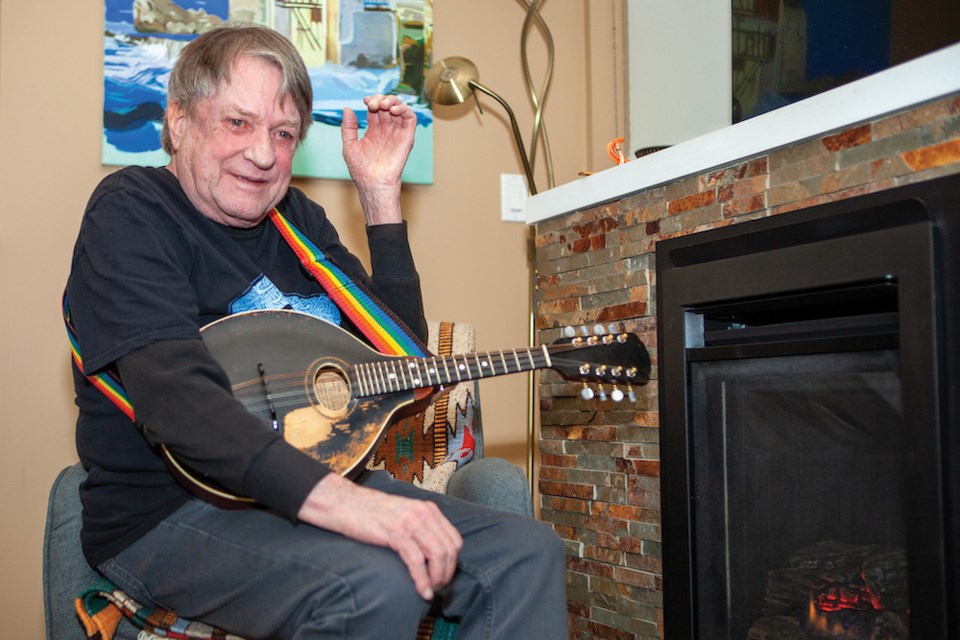In a newly-published autobiography, mandolin-strumming jack of all trades Jon Van Arsdell does more than chronicle five decades of exploits on B.C.’s Sunshine Belt. The book also illuminates a broad swath of regional history, preserving memories of a bucolic era that shaped the character of today’s more gentrified Coast.
“In those days, it was such an interesting place,” said Van Arsdell in an interview with Coast Reporter, “because if you went to Williamson’s Landing, you had one little community. Then if you went to Roberts Creek, it was completely different. And Wilson Creek was different too. People had a close connection to their communities that doesn’t seem to be there like it used to be.”
Van Arsdell took the long way around to find the tight-knit community he memorializes in the book. In fact, when he landed in Garden Bay in 1970 — an Ohio-born objector to the Vietnam War — he was greeted by a sign that did little to welcome “working hippies” (as he was labelled by his financial institution).
“No Longhairs,” the sign proclaimed.
Van Arsdell gets the last laugh. His generously-illustrated book, No Longhairs: The Odyssey of a Vietnam Draft Dodger, shows that countercultural expatriates were hard-working contributors to the interdependent idyll of the Sunshine Coast.
For Van Arsdell, who settled in a growing settlement at Mixal Lake, music and storytelling were staples of the good life. He had arrived in Canada with a 1913 Gibson A-2 mandolin, and soon grouped up with like-minded musicians to form a band: the Pender Harbour Fats and the Mother Furriers. His literary acumen was put to use by Howard White (owner of Harbour Publishing), who commissioned interviews from Van Arsdell with local characters for the Raincoast Chronicles series.
“Then, fluke of all flukes, I got a real job,” Van Arsdell writes. He was hired as the biologist for the first private fish farm in Canada. His band recorded the soundtrack to one of the National Film Board’s most renowned shorts, Street Musique. He made the jump to Egmont — a place he describes as “A Warp in Spacetime.” He started a family. He found work on a commercial salmon seine boat. He never stood still.
“Some of our generation were countercultural in the sense that we felt dissatisfaction with a culture that said we had to go down the same paths as our parents did,” recalled Van Arsdell. The sex, drugs and rock and roll (“all the crazy stories are true,” he writes of a sojourn in San Francisco in 1969) became a way to break the pattern of humdrum forebears.
After a rock-crushing stint with Argus Aggregates, Van Arsdell worked at a remote work camp on Jervis Inlet run by the B.C. Forest Service in partnership with Corrections Canada. “My boss was a convicted bank robber!” he writes. The supervisor ignored the camp’s no-booze policy, smuggling in alcohol and marijuana to pay informants.
Van Arsdell’s yarns — including his Great Egmont Cow Rustle, a “twisty tale of thievery and a genuine test of the Canadian judicial system” — are rich additions to the Sunshine Coast’s legendarium.
His rollicking reminiscences take a poignant turn when Van Arsdell considers the theme of transformation. In 1990, with the help of Alcoholics Anonymous, he learned to manage his own substance abuse. “Do people change? Can people change? Do they really get to the root causes of dangerous behaviour?” he wonders. He writes admiringly of his grandmother in Kentucky, who completely reformed her racist attitudes by reading about evolution and the history of slavery.
The final scene in the book depicts Van Arsdell breakfasting with a group of steadfast friends in Sechelt. As much as they revel in spinning outsized anecdotes about yesteryear, his colourful and surprisingly candid book is the result of encouragement from his children and girlfriend, Carolyne Breadner.
“At social gatherings through the years, people always wanted me to tell these stories,” he said. “Finally, my kids, Kinji and Melanie, they said: Dad, you’ve got to write this stuff down.”
Jon Van Arsdell’s No Longhairs: The Odyssey of a Vietnam Draft Dodger, published by Mandolin Press, is available from local booksellers.


